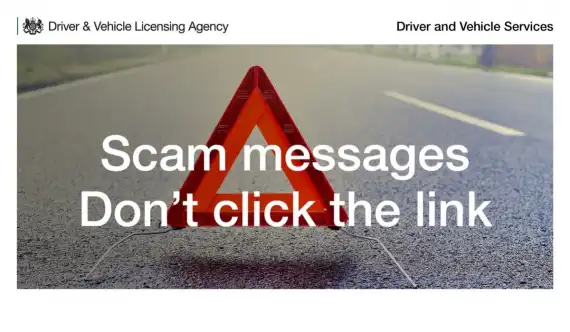
Text and e-mail scams
Drivers face a barrage of scam text messages, dodgy e-mails and misleading websites that conspire to steal their money, harvest personal data and overcharge for services - so take care not to become a victim, The Driver and Vehicle Licensing Agency explained.
Text and e-mail scams come in many forms but there is a consistent theme. Criminals send a short, simple, message which claims you have paid too much road tax, for instance. Recent examples include:
- “We would like to notify you that you still have an outstanding vehicle tax refund of £92.31 from an overpayment”
- "We have identified that you still have an outstanding vehicle tax refund of £61.77 from an overpayment”
These scam messages further claim you must follow a link to a website so your refund can be issued. You are then required to enter a wide range of personal information. Examples include: full name, date of birth, telephone number, postal address, e-mail address and information that relates to your bank and credit cards.
Such information can then be used for a variety of illegitimate purposes. Perhaps the criminals make a copy of your credit card then book expensive, foreign, holidays. Perhaps, in contrast, you receive an e-mail virus which harvests further information from your hard drive. Log in details for internet banking, for starters.
Recognise, therefore, that messages of this nature are always illegitimate. “We do not send e-mails or text messages that ask you to confirm personal details or payment information”, The Driver and Vehicle Licensing Agency confirmed. There are no exceptions at all.
Misleading websites

Misleading websites serve a further purpose. Greedy criminals create a site that resembles its legitimate counterpart that enables you to apply for your driving licence, for example. Naturally, there is a cost. However, The Driver and Vehicle Licensing Agency offer such services for a lower price or for free.
Avoid scam messages and misleading websites
Fortunately, it is easy to protect yourself and others from scam text messages, dodgy e-mails and misleading websites. Simply:
- Delete suspicious e-mails and text messages immediately and never follow the enclosed links
- Use GOV.UK to be certain you are dealing directly with The Driver and Vehicle Licensing Agency
- Recognise that misleading website can appear prominently within the results of legitimate search engines
- Never put personal information on social media that can be exploited by criminals
- Report scam emails and messages to Auction Fraud
- Report suspect websites to search engines




